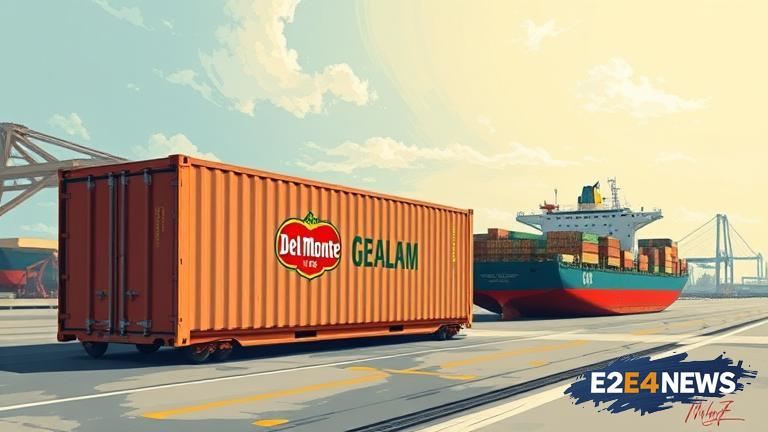In a groundbreaking move, Fresh Del Monte Produce Inc. and CMA CGM have joined forces to introduce containerized shipping for bananas and pineapples in Asia. This innovative approach is set to revolutionize the fresh produce logistics landscape, raising the bar for cold chain standards in the region. By leveraging CMA CGM’s expertise in container shipping and Del Monte’s extensive experience in fresh produce, the partnership aims to provide a more efficient, reliable, and sustainable solution for transporting perishable goods. The use of containers will enable better temperature control, reducing the risk of spoilage and ensuring that products arrive at their destination in optimal condition. This development is expected to have a significant impact on the fresh produce industry, particularly in Asia where demand for high-quality fruits is on the rise. With containerization, Del Monte and CMA CGM can offer a more consistent and predictable supply chain, which will be a major advantage in the competitive Asian market. The partnership will also enable the companies to expand their reach and explore new markets, further solidifying their position as leaders in the fresh produce sector. Moreover, the shift to containerized shipping will help reduce the carbon footprint associated with traditional breakbulk shipping methods, aligning with the companies’ commitment to sustainability. As the demand for fresh produce continues to grow, the importance of efficient and reliable logistics cannot be overstated. Del Monte and CMA CGM’s pioneering effort is a testament to their dedication to innovation and customer satisfaction. The companies’ investment in containerization technology and infrastructure will pay dividends in the long run, as it will enable them to stay ahead of the curve in an increasingly competitive market. Furthermore, the partnership will create new opportunities for growth and development, both for the companies involved and for the broader fresh produce industry. As the containerized shipping model gains traction, it is likely to attract the attention of other industry players, potentially leading to a wider adoption of this innovative approach. In the meantime, Del Monte and CMA CGM will continue to work together to refine and optimize their containerized shipping solution, ensuring that it meets the evolving needs of their customers and the market. The success of this partnership will depend on various factors, including the companies’ ability to navigate the complexities of the Asian market, manage the logistics of containerized shipping, and maintain the high standards of quality and service that their customers expect. Nevertheless, the potential benefits of containerized shipping for bananas and pineapples are undeniable, and Del Monte and CMA CGM’s collaboration is an important step towards a more efficient, sustainable, and customer-centric fresh produce industry. The companies’ commitment to innovation and excellence will undoubtedly drive growth and progress in the sector, and their pioneering effort is likely to have a lasting impact on the way fresh produce is transported and consumed in Asia. With the containerized shipping model, Del Monte and CMA CGM are poised to capitalize on the growing demand for fresh produce in the region, while also contributing to a more sustainable and environmentally friendly logistics landscape. As the fresh produce industry continues to evolve, it is likely that containerized shipping will play an increasingly important role, and Del Monte and CMA CGM’s partnership will be seen as a key milestone in this development. The future of fresh produce logistics looks promising, and the collaboration between Del Monte and CMA CGM is a significant step towards a more efficient, reliable, and sustainable supply chain. In conclusion, the introduction of containerized shipping for bananas and pineapples in Asia is a groundbreaking development that is set to transform the fresh produce industry. With its potential to reduce costs, increase efficiency, and improve the quality of products, this innovative approach is likely to have a lasting impact on the way fresh produce is transported and consumed in the region.
